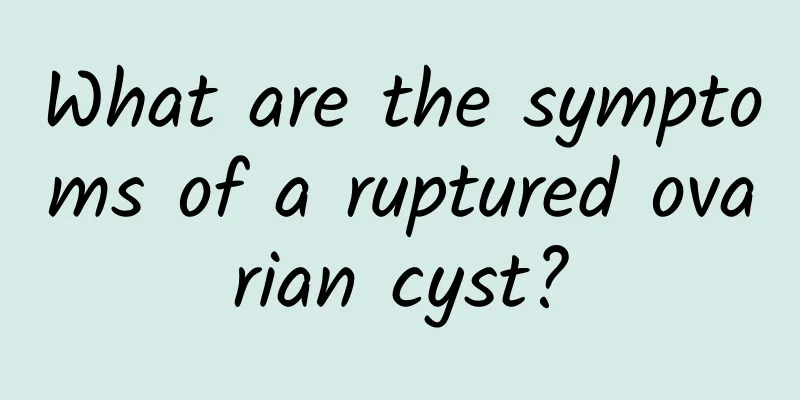What are the symptoms of a ruptured ovarian cyst?

|
What are the symptoms of a ruptured ovarian cyst? Generally speaking, ovarian cyst rupture usually has the following symptoms: 1. Phlegm and blood stasis condense, worry and sadness; deficiency produces phlegm, phlegm and fluid stagnate and block the Qi, causing Qi stagnation and blood stasis, and phlegm and blood stasis forming lumps. Long-term accumulation of phlegm and blood stasis can also lead to cancer. In addition to the above symptoms of Qi and blood stagnation, patients often have fullness and stuffiness in the stomach, palpitations, shortness of breath, poor appetite, edema, nausea, muscle stiffness, increased abdominal circumference, menstrual disorders, difficulty urinating, urgent or difficult bowel movements, distension in the lower abdomen or pits, and a feeling of falling. 2. During the period of Qi and blood stagnation or after childbirth, cold stagnates the blood. Or internal injury, depression hurts the liver, Qi movement is not smooth, Qi and blood are stagnant, and Qi and blood stagnate. If the stasis lasts for a long time, it will turn into cancer. Except for the lump in the lower abdomen, there are generally no obvious symptoms or only petechiae on the tongue. If it is malignant, the lump in the lower abdomen is hard and fixed, painful and resistant to pressure, the skin is not moist and the complexion is purple, and there are petechiae on the tongue. Patients in the late stage of malignancy may have ascites, haggardness, fatigue and other symptoms. 3. To put it simply and intuitively, "ovarian cyst" refers to a mass inside or on the surface of the ovary. The symptoms of ovarian cysts are usually liquid, sometimes solid, or a mixture of liquid and solid. Ovarian cysts are usually small, similar to the size of a pea or cashew, and some cysts grow like a softball or even larger. 4. The pain caused by ovarian cysts can be continuous or dull. Malignant cysts often cause abdominal pain, leg pain, and pain, often causing patients to seek emergency treatment. |
<<: How to prevent pelvic inflammatory effusion
>>: Can I still get pregnant if I have a left ovarian cyst?
Recommend
What are the symptoms of female cervical erosion? There are three typical symptoms of female cervical erosion.
Cervical erosion is a common gynecological diseas...
Can I have a medical abortion at the age of 42? What are the standards for medical abortion?
There are also some women who do not take protect...
Does cold weather help you lose weight? 6 cups of fat burning herbal tea to prevent freezing
Winter is a good time to lose weight! A research ...
Two reasons for female vulvar leukoplakia
The incidence of vulvar leukoplakia is very high,...
What are the types of uterine fibroids?
What are the types of uterine fibroids? Which typ...
Can eating coconut oil help you lose weight? Is it really effective to be rich in precious medium-chain fatty acids?
People who love beauty know that coconut oil can ...
How much does Bartholinitis surgery cost?
How much does it cost to treat Bartholinitis? Bec...
Typical symptoms of ovarian cysts
Ovarian cyst is a common gynecological disease, w...
You should take necessary rest after abortion
In recent years, more and more women have become ...
Correct turtle neck! Exercise your waist and back curves with your ballet teacher
Actress Kang So-ra's past photos of her being...
Women should be alert to these five abnormal leucorrhea signals
Yellow watery vaginal discharge is yellow or yell...
Brief analysis of the symptoms of different degrees of cervical erosion
According to the different conditions of cervical...
What are the reasons for delayed menstruation? Most of them are caused by these 3 factors
Delayed menstruation is a common menstrual disord...
Experts explain the harm of health products to uterine fibroids
Many female friends may not know that health supp...
Male weighing 207 kg and diabetic gastric bypass weight loss
A 24-year-old man in Kaohsiung City, weighing 207...









